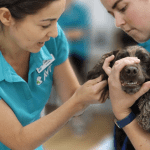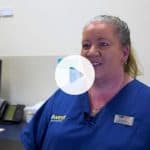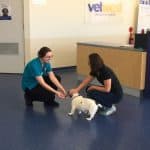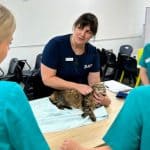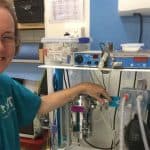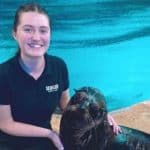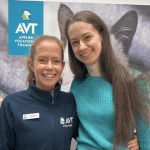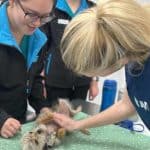Meet Emergency Veterinary Nurse, Teleah Wilcox
We’re incredibly proud of Teleah and her journey from passionate animal lover to accomplished Emergency Veterinary Nurse at Perth Vet Emergency (PVE). Her story is a testament to her dedication to learning, hands-on experience and commitment to animal care. We’re honoured to have been a part of her education and pathway to vet nursing.
Teleah recently took a few moments away from her hectic schedule to answer some questions about her journey to Veterinary Nursing.
What inspired your interest to work with animals?
I’ve always loved interacting with animals. After high school, I studied Conservation Biology and Zoology at university. I did some fieldwork and thought that would be my career path, but unfortunately there were very few job opportunities available. During the COVID-19 pandemic, I reassessed what I wanted to do and decided I wanted to focus on working with animals.
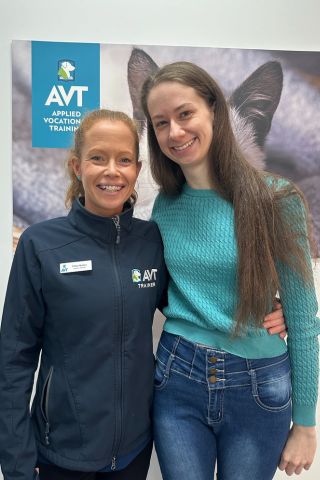
How did your journey start?
My journey started with completing the Certificate II in Animal Care (Health and Welfare) with AVT. It was a hands-on experience, which was perfect since I hadn’t studied for a couple of years. I ended up continuing at Greyhounds as Pets (GAP) as a kennel hand, working with the behaviour team. I also started working at Perth Veterinary Emergency Centre (PVE) as an assistant. I was really involved in procedures, speaking to clients, checking patients in and working in the treatment area for most of my shifts, while still helping on reception.
Why did you want to become a vet nurse?
I knew 100% that I wanted to pursue vet nursing. During a prac in the Intensive Care Unit (ICU) at The Animal Hospital at Murdoch University, I realised I wanted a hands-on role with the patients and to connect with them. I loved studying the Certificate IV in Veterinary Nursing at AVT. I did my placement at Kingsley Veterinary Hospital and loved the general practice there. It was an amazing experience and a great way to harness skills that I wouldn’t necessarily gain in an emergency setting due to the fast pace.
What was your favourite part of the course?
My favourite part of the course was seeing the class grow together and share experiences from our workplaces. For me, being in the workplace and PVE was solidifying the things we were learning in the classroom. I would think of the topics we covered and be like, “That makes sense now!”
“Seeing the patients, who arrived so lethargic they had to be stretchered in, walking out of the clinic with a happy tail when they see their owners, is so rewarding and the reason why I love what I do.”
What is a typical day like at PVE?
I see and am involved in pretty much everything you can think of in veterinary medicine, apart from spays, castrations, dental work, and vaccinations.
At any point, I could be taking x-rays or helping with ultrasounds, drawing and testing blood samples for difficult medical cases, placing nasal lines, nasogastric tubes, rectal Foley, or urinary catheters.
I might also rush into assist a veterinarian with procedures or surgeries on critical cases like a blocked cat, a dog with bloat, or even a caesarean that just walked through the door.
Some days it can be absolute chaos, with activated charcoal everywhere because the dog that ate chocolate was very wiggly, and washing piled high because everyone has diarrhoea. But the team pushes through the madness and makes wonderful things happen.
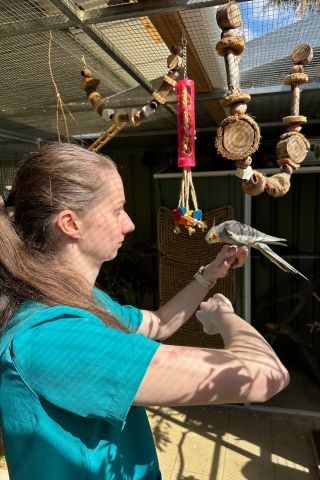
Seeing the patients, who arrived so lethargic they had to be stretchered in, walking out of the clinic with a happy tail when they see their owners, is so rewarding and the reason why I love what I do.
We see patients (and their owners) on the worst day of their lives, and I am so grateful to be part of the remedy to get them home to their loved ones, or over the rainbow bridge if they are in such pain.
What advice do you have for current vet nurse students?
Apply for every opportunity that interests you. Whether it’s the ones available to AVT students, like various internships (Unusual Pet Vets (UPV), PVE, The Animal Hospital at Murdoch University), or ones you find yourself, or even volunteering. Try as much as you can while you are studying. It sets you up to be a more well-rounded nurse and gives you insight into an area that you might want to strive to be involved in. The veterinary world is so broad, and there are so many avenues you can go down. Have fun with it!
What would you say to someone thinking about studying vet nursing?
It’s important to know that it’s not all about cute puppies and kittens. But in saying that, it is so rewarding. If you don’t mind getting your hands dirty and your brain forever processing new information, 100% go for it. Study at AVT! The Trainers and Assessors and support staff are amazing—so knowledgeable, approachable, and genuinely want you to succeed. Your Trainers are actively involved in the veterinary industry, so they have all the current techniques and experiences of a veterinary practice, which is particularly important as the industry is forever developing and changing.
Find out more about Veterinary Nursing
Which Vet Nursing Study Mode Is Best For Me?
Discover the best study mode for your Veterinary Nursing journey at AVT. Explore our on-campus and online learning options, each designed to fit different lifestyles and commitments. Whether you're balancing work, family, or seeking flexibility, we'll help you choose the ideal path to achieve your veterinary nursing goals.How Tracy became the Shelter Support Officer at RSPCA WA
Meet Tracy Brownell, a former stay-at-home mum who became the Shelter Support Officer at RSPCA WA. Discover how her journey with AVT's Certificate IV in Vet Nursing transformed her career and life, inspiring her to become a key figure in animal care and volunteer coordination.Inspiring Veterinary Nurses: Cathleen from student to Aquatic Veterinary Nurse
Meet Aquatic Vet Nurse, Cathleen. She studied Animal Care and Veterinary Nursing with AVT. Now she's one of the first 8 nurses in the world to receive certification in Aquatic Veterinary Nursing.Inspiring Veterinary Nurses: Teleah from student to Emergency Vet Nurse
Teleah's passion for animals, hands-on experience, and dedication to learning have driven her successful career as an Emergency Veterinary Nurse at Perth Vet Emergency.Unleash your Passion: A Guide to our top 7 Veterinary Nurse Specialisations and Training Opportunities
We explore the diverse career pathways available to veterinary nurses, highlighting a range of specialty areas such as emergency and critical care, surgical nursing, diagnostic imaging, exotic pet medicine and more.
Want to learn more? Read more posts about Veterinary Nursing here
Courses you may like
On-Site Intensive
ACM20121 Certificate II in Animal Care (Vet Nursing Pathway)
About Vet Nurse Pathway
Vet Nursing Pathway
Online & On-campus
ACM40418 Certificate IV in Veterinary Nursing
About Vet Nursing
